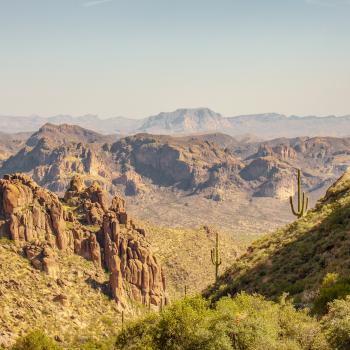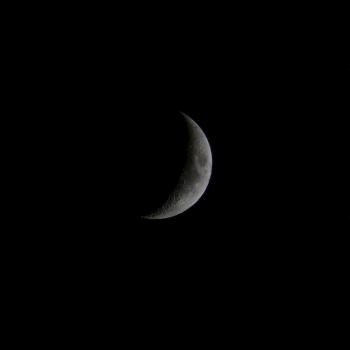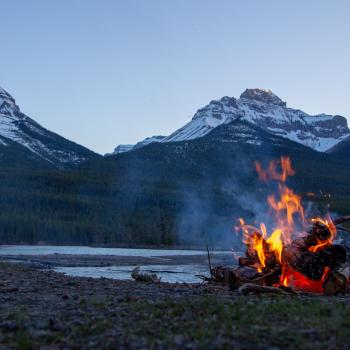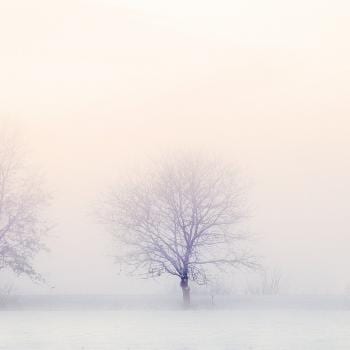For the past few months, the Otherfaith community has been tinkering around with a dedication ritual. A few people have asked me to draft such a ritual and last year I finally did so. The ritual is still in the works, but working on it has shown true the adage that a ritual begins as soon as we start planning it.
Part of the ritual involves a vow (that lasts for a time period specified by the practitioner) to the Gods. This vow has been on my mind a lot.
The Vow
“…I swear:
I will worship the Four Gods and Their spirits.
I will live in accordance with Them.
I will embody Piety, Power, and Pride as they are known to me.
I will act with hospitality and compassion toward all.
I swear these freely.”
Creating the Vow
The specifics of the vow come from older work I did with the Four+ Gods (the deities worshiped in the Otherfaith). My journals throughout the years have been full of ideas for how best to connect to these specific Holy Ones, from the more simple ‘good’ offerings to how best to align one’s self – personality, behavior, ethics – with Them.
The first parts of the vow were easy to come up with. Being part of the Otherfaith, identifying as a capital-letter Other Person, means worshiping the Four Gods. Their spirits usually come right along with Them, so it follows that we would honor them as well. ‘Living in accordance’ is a bit more vague. It hearkens to the idea of ‘right relationship’ with our deities. This involves both having a devotional relationship with Them (where and how we can) and behaving properly both in and out of religious spaces. The next lines explain further what this accordance looks like.
‘Piety, Power, and Pride’ are words that I have long felt important to the Four+ Gods. Behaving piously was important to me when I began this work, and the Gods and spirits Themselves have been very keen on teaching me further. Being reverent of Them, behaving respectfully in ritual space, not speaking poorly of Them…all of this is vital. Power concerns our personal power and how we use it. The Gods of the Otherfaith do not want us to give up our own power to Them, but instead we are meant to learn how to handle our own innate strengths and improve upon our flaws. And when we are actualized in such a way, holding the reins of our power, we can move forward with a true pride that is not braggadocio. We avoid an overwhelming self-hatred or false humility when we take actual pride in ourselves.
(In all honesty, rather standard ‘spiritual path’ sort of stuff.)
I wanted there to be some freedom to how the terms are interpreted, so ‘as they are known to me’ was added. Culture and our more immediate family life can impact how we view these terms. Ideally the Otherfaith will have some cohesion to how the terms are understood even with the added wiggle room.
Acting with ‘hospitality and compassion toward all’ was inspired by the Clarene, the god of commitment and sovereignty. She can be vicious toward those who cross Her or violate a boundary She has set up, but She has always tried to get into my head that compassion and kindness should be one’s first approach. When I was devising the first drafts of the vow Her presence was nearly overbearing. At least until I figured out what She wanted!
The last portion, about swearing freely, is because of the focus on consent and choice we are developing in the Otherfaith. The vow is not meant to ‘take’ if one is coerced into it.
Preparing for the Vow
Funny enough, I haven’t actually taken this vow yet. I have different private vows to the Four+ Gods that I took many years ago. They aren’t appropriate for others, however, and especially not for someone who might just want to focus on the Four+ Gods for a year or two before moving on. So instead I’ve been tinkering with the dedication ritual and contemplating the vow.
Part of the dedication ritual involves a week-long ‘fasting’ period, where the practitioner will abstain from some activity or type of food (their choice). During this period we contemplate the parts of the vow. This is partially to help us decide if we do indeed want to take the vow and to get us in the proper mindset for the ritual itself. (Again, this sort of contemplation period is pretty standard when committing to a religious or spiritual tradition, with how long one is in the contemplation/decision-making stage varying.)
Unintentionally, I’ve been mulling over the vow as I go about my daily life. This is in part regular revision-minded thoughts. How do I want to improve it? Should I add or subtract something? How should I phrase it? Should I make it more poetic?
But a larger part is checking in with myself, “Am I upholding these vows?”
Which is the point of the vow, isn’t it?
(Though the site is no longer active, I am participating in the ‘Pagan Blog Project’. The PBP encouraged writers to write throughout the year, focusing on prompts based on the letters of the alphabet. For the ‘D’ prompt, I chose ‘dedication’.)
















